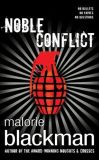
06 Jun 2013 02:07:24
One of Malorie Blackman's strengths as a writer for young adults is her directness and conviction: she takes big themes and gets stuck in. With Pig-Heart Boy it was transplants and animal rights; with Boys Don't Cry it was teenage fathers; most famously, with the Carnegie-shortlisted Noughts & Crosses series, it was racism. With Noble Conflict, Blackman turns her attention to the individual and the state, to the beautiful fictions we believe and the ugly truth behind them. "We stopped thinking for ourselves," says Mac, "because it was easier to let others do our thinking for us."
In a series of extracts from "histories" written by the elders of the ruling High Council, we learn the origin of the conflict between the Alliance and the Crusaders. While the peace-loving Alliance tried to live in harmony with nature, the Crusaders all but destroyed and depopulated their own lands; their attempt to move tectonic plates using nuclear devices resulted in catastrophic volcanic eruptions. Now trapped in the "Badlands", the Crusaders have fixed their sights on the Alliance, and their deadliest fighters, the Insurgents, make regular raids on them.
Kaspar was brought up on his uncle's farm on the edge of the Badlands – a nod to Star Wars. Against his uncle's wishes he joins the Guardians, the Alliance's elite peacekeeping force, just like his parents before him – both of whom died in service. Blackman's masterstroke is to tell this conspiracy narrative from a courageous and committed young soldier's point of view. The layers slowly unpeel, the truth about the Alliance is exposed, and the revelations become all the more affecting.
As ever, for Blackman, story is king. Noble Conflict is set in an indeterminate time. The dialogue is vivid, inclusive, full of energy and ribald humour. In tone, think Die Hard rather than Nineteen Eighty-four.
Blindness, or an unwillingness to see, is a recurring theme; there is a ghoulish hospital scene in which prisoners, their eyelids removed, must stare at never-ending images of atrocities. Terrorist attacks, Ninja warriors, weapons of mass destruction, high-level conspiracies, and touch-telepathy all contribute to a gripping adventure that will encourage readers to question their own assumptions about the world. After all, "What we do with [the] truth is up to each and every one of us."
The reader is aware of Blackman's enjoyment in her writing and also the moral heart that beats at the core of this hard-hitting, exciting fiction. With the eagerly anticipated Noble Conflict, her legions of fans have a treat in store.

